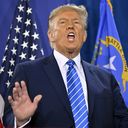Trump takes presidential immunity fight to the Supreme Court

Attorneys for former President Trump on Monday asked the U.S. Supreme Court to block a criminal trial over his alleged efforts to overturn the 2020 election.
Why it matters: The appeal puts the Supreme Court at the center of yet another legal dispute that could have ramifications for the Republican presidential frontrunner and the outcome of the 2024 election.
- Trump previously appealed to the nation's highest court in January over a Colorado Supreme Court ruling.
- Colorado's highest court removed him from the state's ballot this past December after finding that the 14th Amendment's insurrection clause applies to his actions related to the Jan. 6 Capitol riot.
What they're saying: "As President Trump's powerhouse Supreme Court filing explains, if immunity is not granted to a President, every future President who leaves office will face the prospect of being wrongfully indicted by the opposing party," Steven Cheung, a spokesperson for Trump, said in a statement shared with Axios.
- Cheung said that "without complete immunity, the President of the United States will not be able to function properly."
- "Even while the President is still in office, his political opponents will use the threat of future prosecution as a weapon, effectively blackmailing and extorting him to influence his most sensitive and important decisions," Cheung added.
- "The Supreme Court should grant the requested stay and put an end to Deranged Jack Smith's repeated attempts to corruptly short-circuit the ordinary and correct functioning of our justice system."
Catch up fast: Trump and his legal team have repeatedly argued that he has absolute immunity from criminal prosecution for actions that were performed within the "outer perimeter" of the president's official duties.
- In December, the judge presiding over the case put the trial on pause and postponed it indefinitely while the appeals court considered the immunity question.
In a unanimous ruling earlier this month, the U.S. Court of Appeals for the D.C. Circuit rejected Trump's immunity claim.
- "We cannot accept former President Trump's claim that a President has unbounded authority to commit crimes that would neutralize the most fundamental check on executive power — the recognition and implementation of election results," the judges wrote.
- "Nor can we sanction his apparent contention that the Executive has carte blanche to violate the rights of individual citizens to vote and to have their votes count."
- Trump had until Feb. 12 to appeal the decision.
Background: In the federal case, Trump was charged with conspiracy to defraud the U.S., conspiracy to obstruct an official proceeding, obstruction of and attempt to obstruct an official proceeding and conspiracy against rights.
- He pleaded not guilty last August to the charges.
What's next: The Supreme Court has multiple options in light of the appeal.
- The court can deny a stay in the case, which would send it back to U.S. District Court and allow Judge Tanya Chutkan to restart the trial.
- The court could allow a brief stay, and then deny a petition of review from Trump. Doing so would allow the appeals court ruling to stand, denying the former president immunity.
- They could fast track the case, as the Supreme Court has done with Trump's Colorado ballot eligibility case. In doing so, the immunity case would be given priority and likely be heard in the coming weeks.
Separately, the final option is to leave the case on the court's regular schedule, which would likely delay oral arguments until after the general election in November.